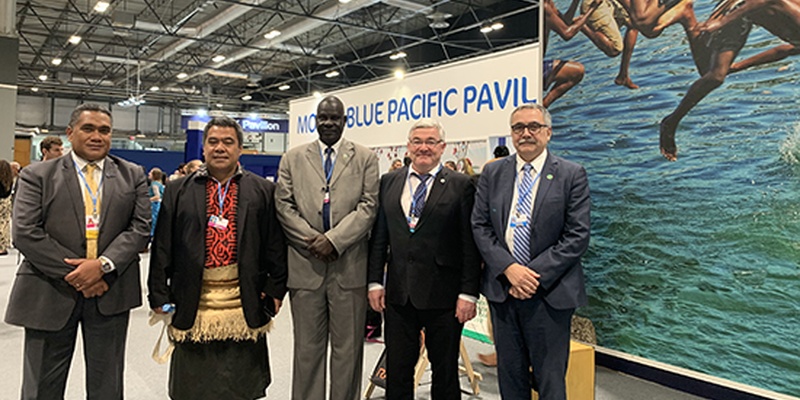The International Year of Plant Health at the UN Climate Summit
Posted on Tue, 17 Dec 2019, 15:14

The keynote speakers of the side event on “Towards the International Year of Plant Health in 2020: Protecting Plants, Protecting Lives” at COP25 in Madrid, Spain @FAO
Madrid, 10 December 2019 – The Tongan government in collaboration with the IPPC Secretariat organized a side event at the twenty-fifth session of the United Nations Climate Change Conference of Parties (COP25) in Madrid, Spain. One of the key objectives of International Year of Plant Health (IYPH) 2020 is indeed to raise awareness of the importance of healthy plants for achieving the 2030 Agenda for Sustainable Developments Goals, including SDG 13 on Climate Action. Entitled “Towards the International Year of Plant Health in 2020: Protecting Plants, Protecting Lives”, the session explored how climate change is affecting healthy plants, and what can be done to protect them, particularly in the Pacific Islands. Keynote speakers and experts from FAO, IPPC and the government of Tonga addressed those crucial issues at the UN Climate Summit. The session was moderated by Mr Paula Pouvalu Ma’u, Chief Executive Officer for Ministry of Meteorology, Energy, Environment, Climate Change and Communications of Tonga.
In his keynote speech Mr Rene Castro, FAO Assistant Director-General, Climate, Biodiversity, Land and Water Department stated that the mutual relationship between plant health and climate change is creating new challenges to the scientific community and governments. “Connecting plant health and climate change is not a stylistic exercise: there is evidence that climate change reduces plants’ resistance and resilience to pests and diseases”, he claimed. “We need to strengthen phytosanitary systems that are able to predict and mitigate the effects of climate change on crop protection and production, and better research on plant health and climate change to inform policy decisions”, stressed the FAO Assistant Director-General.
On the other hand, Mr Arop Deng, Integration and Support Team Leader of the IPPC Secretariat explained how the IPPC is working to secure plant health worldwide, and how the work of the IPPC strongly supports the UN 2030 sustainable development goals 13 and 15, respectively on Climate Action and Life on Land. In particular, the inclusion of a specific development agenda on assessing the impact of climate change on plant health in the new IPPC Strategic Framework 2020-2030 is an evidence of the prominence the IPPC gives to the subject. In his remark, Mr Deng illustrated the existing relationship between climate change, plant health and the economic growth. It is indeed estimated that USD 220 billion of trade in agricultural products are lost every year due to pests.
To render the issue even more concrete, Mr Ralf Lopian, Chairperson of the IYPH International Steering Committee, focused his presentation on the scientific aspects of how climate change may affect the distribution and epidemiology of pests. Based on the example of the Mountain Pine Beetle (Dendroctonus ponderosae), a bark beetle affecting pine trees in western North America, he explained that climate change most likely be responsible for its rapid extension to the north and east in Canada. He also explained that hunger and climate change are among the main drivers leading to economic desperation, mass migration and possibly war. Plant health policies should be strengthened internationally and nationally to contribute to avoiding these effects.
The effects of climate change on plant health can be more devastating when it comes to small and remote islands depending primarily on agriculture, such as the Pacific. As addressed by Mr Villami Kami, Deputy CEO at the Ministry of Agriculture, Food, Forestry and Fisheries of Tonga, Pacific governments need to take urgent actions to prevent the spread of plant pests and diseases into their insulated territories where agriculture is the main source of income for most of the Pacific inhabitants. In his presentation, he provided many examples of invasive pests and diseases, citing the Asiatic Rhinoceros Beetle, a plant pest that is now killing palms and destroying the coconut production in the tropical Asia and the Pacific islands. To address those issues and further expand the discussion, Pacific islands planned to gather in 2020 for a regional conference in Fiji.

*
Oradores principales de la sesión paralela de la CP25 en el AISV realizando una foto justo después del evento @FAO

